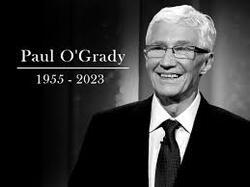 If you want to know what Paul O'Grady achieved for representation of drag and representation of gay people on TV as a whole, you just need to look at what was there before Lily Savage came along. Before Lily, there was John Inman, Larry Grayson, Liberace and Danny La Rue. They were homosexuals playing heterosexual caricatures of gay people, in much the same way that comedians such as Frank Carson and Charlie Williams were Irish and Black comedians playing a caricatured version of Irish and Black people to appeal to a British and White audience. Lily Savage changed the rules about what drag artists and gay performers could be on television. She was not a camp apologist, putting on airs and graces while coming out with 'saucy' remarks and double entendres, she was a crude working class woman with a barbed tongue and a foul mouth who said it like it was and took no prisoners in her put downs. She reclaimed drag and queer culture from straight people, and in doing so she also brought it into the mainstream on her own terms. Born on the streets of Liverpool, she was to Merseyside what the likes of Ena Sharples and Elsie Tanner were to Salford, a homage to the working class women of the cities their creators grew up in. But Lily wasn't just written by a man, she was played a man. That, without compromising or changing the character in any way, she could go on to host chat shows and take on a TV quiz show that was forever associated with Sir Terry Wogan was a testament to Paul O'Grady's talent and integrity. While Lily undoubtedly helped to pave the way for all that followed, there is something very different between her and the modern day equivalent as seen on Drag Race UK. While Baga Chipz and others may be closer to Savage than they are to the American influences that dominate the UK show, you still could not imagine O'Grady compromising his creation by putting her into a competition with other drag queens and playing silly games for a late night TV audience. It is not something that the character of Lily would have done, so it is not something that O'Grady would have made her do. Lily was a person in her own right. Or was she? Lily was not a 'real person'. Although O'Grady drew on his mother, his relatives and other females he knew, she was his creation, a composite of all those people and more. That O'Grady tired of playing her was his right, but moving on from a creation that defines you always comes with the risk of a long journey into anonymity as the public forever associate you with the thing that made you famous. If you don't believe me, just look at the example of JK Rowling, who, even when she is being called out for transphobia, and in spite of her crime writing alter ego, is still referred to as the Harry Potter author. Or look at Kelsey Grammar who is back playing Frasier because, almost 20 years after he quit the role, no one can remember anything he's done when he wasn't playing Frasier. O'Grady resisted the pressure to keep Lily alive (even if he did retire her to a convent in Brittany rather than kill her off) and he also refused to settle for the easy option of continuing to play a character he no longer wanted to be. His decision paid off. His post Lily career saw him earn the dubious honour of National Treasure, alongside Graham Norton and Dale Winton. While this may still say something about the way mainstream audiences like their gay icons to be cuddly and safe, all three of them were (and in Norton's case still is) far better role models for queer representation that Inman, Grayson or De La Rue were as they have not been filtered through straight perceptions of what gay characters should be. Paul and Lily were, at least, unconscious inspirations when I was writing Make-up - the idea of the performer getting tired with their creation, wanting to leave her behind but finding that their audience won't let them, has an unconscious echo to Paul's decision to retire Lily - but they were more than that. Without them, it is unlikely that a play such as Make-up would ever be made, let alone draw an audience that includes large numbers of heterosexuals who engage with the Q and As we do after most of the performances. O'Grady was a trailblazer twice over. But more than that, he seemed to be a genuinely nice person. Paul and Lily are now gone, but their memory and influence will live on. Rest in Peace both of you.
0 Comments
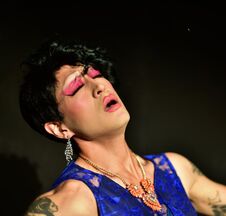 Fame has always conveyed the illusion of intimacy, letting us believe that our heroes are people we know. In the age of social media, the increased insight into the backstage life of celebrities only adds to the feeling that there is no distinction between the public celebrity and the private individual. We have 24/7 stars who, in our minds at least, never take a day off. That this is not true is reflected in all the people who talk about the disappointment of finally meeting their heroes and being thoroughly let down by them. With Make-up, I wanted to move beyond the stage persona and introduce audiences to the person behind the performer. As the play opens, Lady Christina returns for a last encore. She isn’t just a character that Christopher Laneghan has created, she’s his alter ego, born out of everything he’s gone through. But it’s only in the dressing room that all the pieces can fall into place. To discover Christina, I had to take Chris Laneghan back not just to the moment he was born, but the moment he was conceived, and then go back even further, to understand who his mother was, who his father was, how they were with each other and how they were with him. The first decisions I made, that Chris was born in Birmingham in 1975, meant that he was born into a world where homosexuals were seen as legitimate targets for jokes by music hall comedians on primetime TV. That, and the presentation of gay characters in sitcoms, made it so much harder for people to admit their sexuality to themselves let alone to their parents. 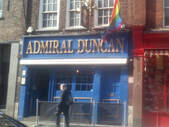 Being born in 1975 also meant that Chris was 13 when Section 28 of the Local Government Act, which stated that; 'A local authority shall not (a) intentionally promote homosexuality or publish material with the intention of promoting homosexuality; (b) promote the teaching in any maintained school of the acceptability of homosexuality as a pretended family relationship', came into force, and that he was living in London in 1999, when a nail bomb went off at the Admiral Duncan Pub in Old Compton Street. I thought about how these would influence the decisions Chris made, as well as how his life would have been shaped by the general backdrop of the 80s and 90s. The only things I knew for sure was that somewhere along the way Lady Christina would come into being, but Christina would have her own history. She is a character in her own right, with her own personality. She is shaped by Chris’s childhood and early years as much as he is, but they have different ways of dealing with it. And now, Lady Christina has been with Chris for more than two decades. The world has changed, audiences act as if they own a character and there is a sense that drag as a whole may have left its original performers and audiences behind as it turned into a commodity for mainstream markets. All of this, and more, form the person we see taking their encore at the start of the show. We just don’t know about it until we meet them backstage. 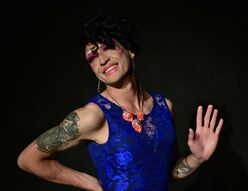 Hindsight is a wonderful thing. If only we knew it at the time. One year ago, we received an offer from Underbelly to put Make-up on at the 2020 Fringe. Coming ten years after NoLogoProductions made its Ed Fringe debut with a free show at The Counting House, we’d finally made it into the big four. The date the deal was sealed? Not April 1st. Instead, it was a few weeks earlier, on the far more ominous Friday 13th. Less than three weeks later, one day before the first day of April, as if to avoid the possibility that anyone could think they weren’t being serious, an email arrived that began with the words ‘It is with great sadness that I am writing to inform you that the Fringe Society have made the decision to suspend planning and operations for the Fringe 2020 in line with other summer festivals.’ The last part of that sentence is worth noting - ‘Other summer festivals’. Make-up was due to be on at Brighton Fringe, Greater Manchester Fringe and Buxton Fringe, all before arriving in Edinburgh. It had also been selected for the Supported Programme of the Highlands and Islands Touring Network, which was going to see us perform a little bit of the play on the Isle of Skye at the end of April in the hope of attracting other promoters to book us in for an autumn tour. It all had the feeling of being the big one, the play that would be the one that got us noticed. One by one, the house of cards came tumbling down. The Edinburgh cancellation came three hours after Greater Manchester fell. Brighton and Skye had been called off within a day of each other just five days after we’d got the Edinburgh offer. Only Buxton remained, hanging on proudly and defiantly, in the hope that they would be able to provide something to lift people’s spirits in July. Emails flew around about different options for getting shows on, including streaming performances, in the mistaken hope that even if we couldn’t travel, we might still be able to get into an empty theatre somewhere. It was the beginning of June when all hope was officially abandoned as an email confirmed that our registration and venue fee was back in the PayPal account it came from. The reaction of other performers to the cancellation of Edinburgh was interesting. For weeks, there’d been calls, and indeed demands, on forums for the Fringe to be cancelled. One performer continually posted a letter he had sent to the Fringe Society insisting they acted quickly. For him, and many others, a continued refusal to cancel was creating a state of limbo, with large rental deposits having to be paid along with Fringe registration fees. This at the same time as their income was disappearing, with self-employed, freelancer and zero-hours contract staff becoming bywords for not working. For me, as someone based in Edinburgh, I’d have been happy to have been kept dangling on a string for as long as possible, if there was even the remotest chance that we could have the play on in front of a live audience sometime in August. It wasn’t that I was facing some sort of existential dilemma - If a tree falls in a forest and no-one’s there to hear it, does it make a sound? If a playwright writes a play and nobody sees it, is he a playwright? – and while I did feel a bit like some sort of vindictive God had set out the finest and largest meal I could imagine just to grab the plate away as I was about to tuck in, I got over that and told myself that anything that was meant to happen in 2020 could happen in 2021 (or maybe 2022 if I had really been blessed with the gift of hindsight). So why was I so keen to get the show on? It was more about what it would mean. That life was getting to back to normal, that the virus was being defeated and that people could go out and immerse themselves in culture, sport, beer, food or whatever else took their fancy. Of course, Edinburgh didn’t happen. The closest the city came to it was a stand-up show in the courtyard of The Three Sisters courtesy of Nathan Cassidy. It was good, but not quite enough to make up for what had been lost. 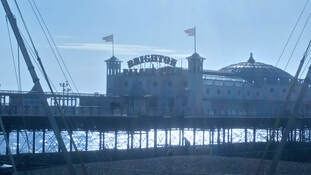 Instead it was October, when a brief window opened and a drastically reduced boutique version of Brighton Fringe took place. We were proud and delighted to be one of the companies that performed there and for Make-up to have its official premiere there on October 7, 2020 (its unofficial premiere was a few days earlier with a preview show at the cornerHOUSE in Surbiton, where a show intended for performance in a small intimate space was put on in a large hall with cabaret tables in a style that eerily mirrored one of the lines in the play). With 10pm curfews having been announced a couple of weeks earlier, and a second English lockdown just around the corner, every night felt like it was a bonus and also felt like it might turn out to be the last one. As it was we made it through the four days, and the fringe made it to the end of the month. All of this was down to people like JD and Sarah at Sweet Venues and all of the Brighton Fringe team, people for whom giving up and admitting defeat didn’t seem to be an option because they were blessed with the sheer determination and bloody mindedness needed to get at least some venues open and some people back into the theatre. Thanks to them, Brighton Fringe took place last year and will forever hold a special place in our hearts. It was great to be getting the show in front of a crowd and it was great to be working with such wonderful people. With Brighton Fringe 2021 now confirmed, and with Make-up scheduled to be on at The Rialto, we’re looking forward to coming back in June. We hope to see lots of people at the show, not just because it will mean that they want to see it, but because it will mean that they can. As for Edinburgh, Buxton, Manchester and the Highlands and Islands, we’re keeping our fingers crossed… |
AuthorAndy Moseley, writer and director of Make-up talks about the play, making theatre during lockdown and anything else that springs to mind. Archives
March 2023
Categories |
 RSS Feed
RSS Feed
